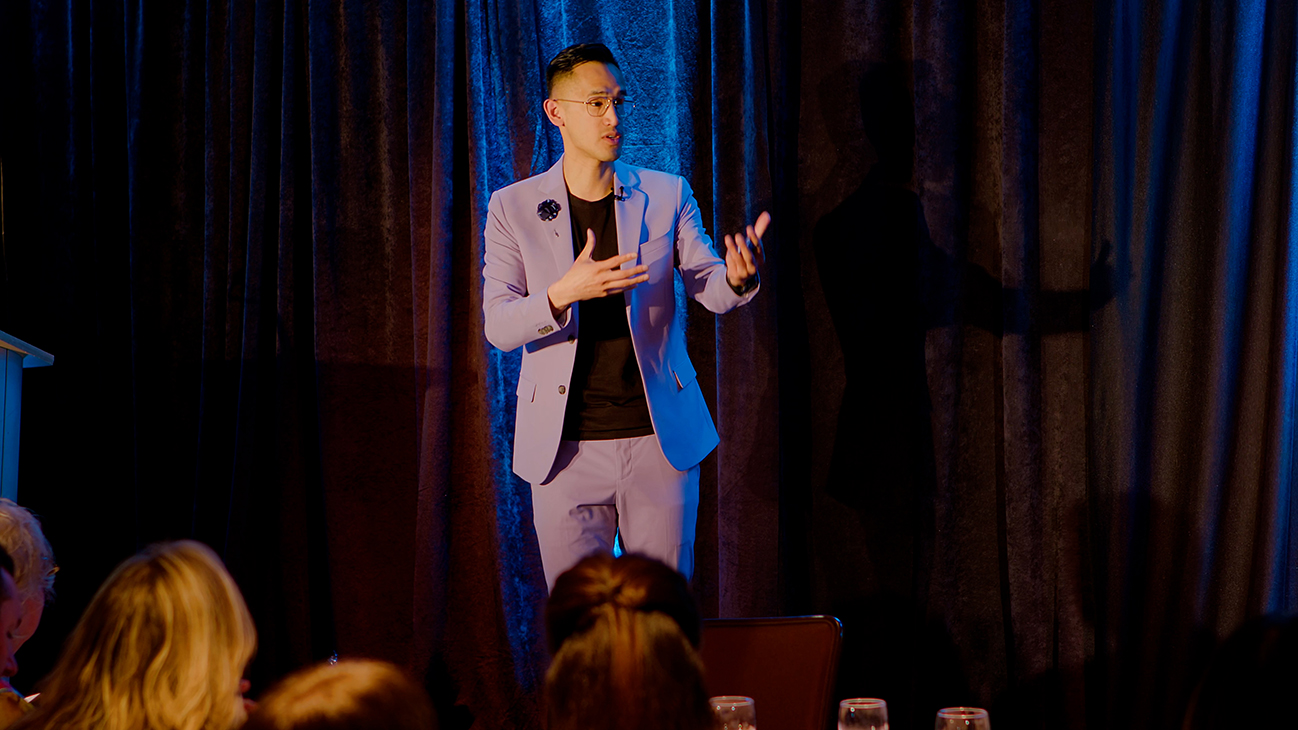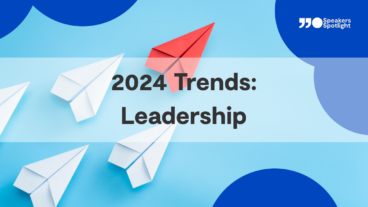Artificial intelligence (AI) is not the future of events — it’s the present. AI is here to stay and its impact on the events industry is far-reaching and game changing. Event planners who embrace it will find themselves at the forefront of innovation, creating experiences that are more personalized, inclusive, and impactful than ever before.
But beginning your AI journey can be daunting. There’s a lot of noise out there that makes it tricky to know how and where to start. That’s where Jay Kiew steps in. He is an innovation and change navigation expert, well-versed in the world of AI, who helps organizations skillfully navigate this next evolution of work and develop the AI fluency necessary to thrive now and into the future.
Jay recently applied his lens of expertise to the events industry at the 2024 CanSPEP Conference. His exploration of the transformative impact of AI on events earned him a standing ovation as his audience of event planners left ready and excited to conquer this new era of event management.
So, as meeting and event planners, how do we leverage AI to enhance the experiences we create? What’s in it for us and how can AI drive real transformation in event planning? Let’s dive in.
Navigating the Noise: The AI Transformation Playbook
Jay employs a three-part transformation playbook to help individuals and organizations best navigate the complex AI landscape. Here’s what that looks like for the events industry:
1. Zoom Out to Zoom In: A Strategic Overview of AI’s Potential
There are endless options when it comes to AI with new tools and software constantly making their way into the conversation. The difficult part today is determining what to focus on. It begins with the questions “what matters most” (zoom out) and “what matters now” (zoom in).
The most common usage of custom GPT programs (such as ChatGPT or Jasper AI) that would have the most impact on an event planner’s day to day, Jay said, are image creation (Canva, Nightcafe, etc.); education, such as live captioning and translation (Interprefy); and productivity. For example, he continued, you can input your event budget into ChatGPT and ask for its recommendations — how much revenue will I need to cover additional programming costs this year? Where is there the most opportunity to save money?
You don’t have to navigate your business alone anymore. And with help covering the grunt work, comes more time to explore and continuously innovate.
2. Work in Wonder: Designing Events for Maximum Impact
The next step is to work within a “wonder” mindset, as in “I wonder what the future of event experiences can look like?” Are we designing events that are “good enough”, or are we pushing boundaries to create something truly memorable? AI offers event planners the opportunity to differentiate experiences, demonstrate ROI, and foster deeper connections among attendees.
For instance, Jay said, almost every event has a name badge. We can now make those badges work for us in creating a more meaningful event experience. Smart badges streamline networking — attendees can tap their badges together and receive all the information they need to connect post-event. They can also enable curated matchmaking, proactively connecting attendees who share similar goals or interests — “find your shared colour”.
AI also enables planners to be more agile and adapt and act in real time as an event unfolds. Through those same smart badges, you can gain location-based insights, which can transform the way event planners demonstrate ROI to exhibitors and sponsors alike. They can also highlight areas of the exhibition hall that are lacking traffic and execute gamification strategies in the moment to drive traffic to those exhibitors.
Lastly, AI tools are instrumental in creating more inclusive and accessible events. Interprefy, Jay said, offers real-time translation and captioning, breaking down language barriers that existed pre-AI.
Jay Kiew’s presentation was a significant highlight of the weekend — constantly referenced by attendees. His mix of personal stories and professional advice was both motivating and relatable, making a lasting impact on everyone who listened.
Canadian Retinoblastoma Research Advisory Board
3. Create with Care: The Human Connection
Despite AI’s incredible potential, the transformative power of events still lies in human connections. And in a world where loneliness has been declared an epidemic by the World Health Organization, this has never been more important, Jay said. AI can help us do more with greater efficiency, but it’s most powerful when used as a tool to enhance the care and connection that already makes events truly special.
“Exploration is the spark to innovation,” Jay said. By approaching AI through this curious, explorative lens, we can ensure that AI is our partner in enhancing the work we do.
Navigate, Evolve, Flourish
Jay Kiew’s informative and motivating presentations on AI and digital transformation empower audiences to embrace new technologies and build future-ready organizations. He customizes each of his talks to his audiences, offering industry-specific advice and resources.
But what makes Jay’s keynotes a truly unique experience is the remarkable blend of professional expertise and personal resilience that he offers. Jay is a half-blind cancer survivor, whose life is a testament to resilience in the face of adversity. By sharing his personal and professional story, he equips audiences with the practical tools and mindset needed to successfully navigate change and disruption.
Contact us to learn more about Jay and how he can create a customized presentation for your audience to help them navigate the unique challenges their industry faces.
Jay’s passion and energy is magnetic, and his collaborative approach has a natural warmth that draws people together.
Telus Health Virtual Care




